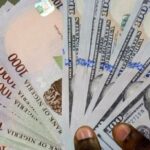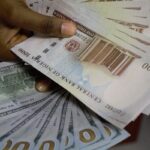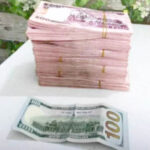The Naira yesterday recovered against the US dollar at the parallel market as it appreciated to N1280/$, according to market information obtained by Nairametrics from currency traders.
This implied that the Naira appreciated by N120, representing a gain of 8.57 per cent when compared to the N1,400 to a dollar at which it traded on Friday.
Currency traders confirmed that they sold between N1, 280 and N1,300/dollar.
The local currency had, midweek lost a third of its value barely two weeks after strengthening to below N1,000 against the dollar.
- Was naira’s world record a fluke?
- How low income earners battle for survival amidst rising inflation
It later dropped to N1,400 against the dollar at the black market on reports of fresh demand pressure.
This had made many people to question the impact of the sales of $15.83 million to 1,583 Bureau De Change (BDC) operators by the Central Bank of Nigeria (CBN).
The apex bank had, on Monday announced the sale of $10,000 to its licensed currency traders nationwide at the rate of N1,021/$1 as part of its plans to aid foreign currency accessibility for qualified end users and stabilise the foreign exchange market.
Currency traders had attributed the recent depreciation of the Naira to market forces as supply had been unable to meet up with the demand.
Meanwhile, a data from FMDQ showed that the Naira continued its downward trend against the greenback at the official foreign exchange window, closing at N1,339.23/$1 on Friday.
This represents a 2.24 per cent depreciation when compared to the N1,309.88/$1 that was reported the previous day.
Recent initiatives by the apex bank had tempered forex scarcity, aiding the Naira’s recovery from an early March rate of N1,617 per dollar to N1,072 per dollar on April 17.
BDCs proffer solutions to depreciation
Meanwhile, the Association of Bureaux De Change Operators of Nigeria (ABCON), has revealed plans for a unified retail end of the foreign currency market to tackle the recent Naira depreciation.
The president of the association, Aminu Gwadabe, disclosed this on Friday, noting that the move would tackle volatility and boost regulatory compliance within that market segment.
According to him, the association is implementing plans meant to unify operators from different cadres of the market, including the inauguration of state chapters for market coordination, integration and administering a united market structure.
He revealed plans to upgrade ABCON’s Business Process Platform, formerly called SAAZ Master.
“Part of our vision for a united retail-end forex market includes activating geo-mapping and automated BDCs physical office verification exercise using the Remote Gravity Physical verification apps.
“This will enable forex buyers to easily locate BDCs offices for effective and seamless transactions,” he stated.
Currency can’t appreciate in a vacuum – Senator Nwoko
Senator Ned Nwoko yesterday advised the federal government and the CBN against any measure capable of artificially forcing the Naira to gain value against other currencies.
Nwoko, who represents Delta North, gave the advice in a statement he signed and made available to the News Agency of Nigeria (NAN).
He stated that continuous revisits to previously implemented policies and considerations of new ones were imperative.
He noted that the value of a sovereign nation’s currency is the cornerstone of respect and collaboration among nations.
The lawmaker emphasised that Nigeria must stimulate Naira demand.
According to him, as a country that exports crude oil and other commodities globally, it is imperative that all transaction on these items be conducted exclusively in Naira.
“This will incentivise buyers to seek out Naira, thereby driving its appreciation due to increased demand and scarcity.
“Moreover, the foreign reserve policy warrants reassessment.
“The practice of maintaining reserves in foreign jurisdictions, termed “foreign reserves,” is not only objectionable but also counterproductive to Nigeria’s economic sovereignty.
“Unlike other countries like the United States, Britain, France and Japan, which hold their reserves domestically, Nigeria’s adherence to this practice raises questions about its colonial legacy.
“If our early indigenous leaders acquiesced to this approach due to colonial influence, why should we perpetuate it? The primary rationale often cited to justify foreign reserves is trade balance maintenance,” Nwoko said.
According to him, this argument lacks merit when considering the limited number of traders involved in importing goods into Nigeria, which constitutes a negligible fraction of the country’s population.

 Join Daily Trust WhatsApp Community For Quick Access To News and Happenings Around You.
Join Daily Trust WhatsApp Community For Quick Access To News and Happenings Around You.



